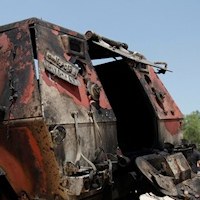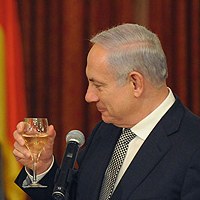![]()
Sun, July 29, 2012 | RubinReports | By Barry Rubin
Speaking to an often-cheering group of about 400 people in Jerusalem, Governor Mitt Romney gave a speech less notable for what he said than for the fact that the audience believed he was sincere in saying it.

Jerusalem’s Old City is seen in the background of where Republican US Presidential candidate Mitt Romney delivers a foreign policy speech from Israel. July 29, 2012. (Photo by Yoav Ari Dudkevitch/FLASH90)
At a beautiful outdoor setting with the Old City in the background, Romney declared his strong support for Israel, using phrases often heard from American presidents. He also proclaimed his view that Jerusalem is Israel’s eternal capital. The difference between the two presidential candidates, of course, is that those Israelis listening to both of them are less inclined to think that when President Barack Obama said similar things to AIPAC meetings he was describing what he thinks and intends to do.
Clearly, Romney was restrained by the American principle that partisan politics stops at the water’s edge, the view that no politician should criticize a president or U.S. government while abroad. Thus, Obama’s name — or even his specific policies — was never explicitly mentioned.
What Romney did do, however, was to scatter among the assertions of U.S. support for Israel’s security and a strong belief in a U.S.-Israel alliance some subtle references that many viewers and much of the mass media are likely to miss. Here are the key ones, which give some hints about Romney’s future campaign and possibly his presidency:
- Not allergic to Israel’s center-right. Romney quoted former Prime Minister Menahem Begin twice and referred to “my friend, Bibi Netanyahu.” Obama wouldn’t have cited either man and is known to loathe Netanyahu. Romney and Netanyahu have known each other for years. The Begin quotes were significant: that Israel will never again let its independence be destroyed (a reference perhaps to Israel’s need not to be completely subservient to America’s current president) and that if people say they want to destroy you then believe them (an explicit reference to Iran’s drive for nuclear weapons).
On the other hand, however, Romney should have quoted Yitzhak Rabin, Shimon Peres, or someone else to balance things off. Romney should not mirror Obama’s approach of choosing one sector of Israeli politics to cultivate. And since there is a broad Israeli national consensus on “foreign policy” this would not be at all hard to do.
- “The reality of hate.” This phrase used by Romney struck me as very significant. It occurred in the context of speaking about how many Arab and Muslim forces feel about Israel. It shows that he is aware that the desire to destroy and injure Israel goes beyond pragmatic considerations and is not something people will be talked out of trying to do. It is enormously important for an American president to understand that there are those in the Middle East who hate the United States and Israel and that it is impossible to appease or befriend them.
- He also said that Israel “faces enemies that deny past crimes against the Jewish people and intend to commit new ones.” This was a reference to Iran but also reflects his understanding about the depth of the conflict and the incredible difficulty of resolving it, a contrast to Obama’s at-least-initial stance.
- A real comprehension of terrorism, not mitigated by attempts at “balance” or rationalization. Romney referred both to the Munich Olympics attack — significant given the ongoing Olympics and his own experience running the Games — and the tenth anniversary of a bombing at Hebrew University that, he noted, killed both Israeli and American students.
- While spending much of the speech declaring his commitment to stopping Iran from getting nuclear weapons—a position that Obama also takes in his rhetoric — Romney also mentioned Iranian dissidents, recalling their repression by the regime. A knowledgeable listener would recall that Obama refused to help the dissidents. “The threat to Israel comes not from the Iranian people but from a regime that oppresses them,” Romney said.
- Of tremendous importance was Romney’s hint that the weakness of the Obama administration has encouraged extremists to become more aggressive and Iran to be bolder. He never said this directly but mentioned “the ayatollahs in Tehran testing our moral defenses” to see if the West would abandon Israel. Perhaps the speech’s most important line was this one:
“We cannot stand silent as those who seek to undermine Israel, voice their criticisms. And we certainly should not join in that criticism.”
This is a critique of Obama’s argument that he would persuade the Arabs to end the conflict by distancing the United States from Israel.
- On one point, Romney seemed to echo Obama by saying that the United States should be on the “right side of history.” Yet he added that the United States must make strong arguments to shape the values and systems that prevail in the Arab world. In contrast, Obama’s policy seems more passive, merely accepting whatever prevails in those countries. One could go even further and point to Obama’s backing for Muslim Brotherhood forces on a number of occasions.
References to the Arab world were relatively limited. On Egypt he said that hopefully the new government there understands the importance of respecting minority rights and keeping the peace agreement with Israel. Syria, Romney said, in an outdated phrase, was on the verge of civil war. The civil war has already arrived.
Much of the rest of the speech discussed the threats to Israel, the common interests of the two countries, and other staples of such occasions. Israel, Romney stated, exports technology, not tyranny and terrorism.
What was especially interesting was Romney’s list of five factors that brought together the United States and Israel: democracy, the rule of law, a belief in universal rights granted by our Creator (a reference to the Declaration of Independence and a subtle rebuke to Obama’s frequent omission of that divine attribution), free enterprise, and freedom of expression.
And then Romney added something that might become one of his most important lines in the months to come: Capitalism was the only economic system in history to raise people from poverty and create a huge middle class.
![]()
Read the transcript and watch the full speech below:
httpv://www.youtube.com/watch?v=dWHC7_f5-rc
Thank you for that kind introduction, Mayor Barkat, and thank you all for that warm welcome. It’s a pleasure and a privilege to be in Israel again.
To step foot into Israel is to step foot into a nation that began with an ancient promise made in this land. The Jewish people persisted through one of the most monstrous crimes in human history, and now this nation has come to take its place among the most impressive democracies on earth. Israel’s achievements are a wonder of the modern world.
These achievements are a tribute to the resilience of the Israeli people. You have managed, against all odds, time and again throughout your history, to persevere, to rise up, and to emerge stronger.
The historian Paul Johnson, writing on the 50th anniversary of the creation of the Jewish state, said that over the course of Israel’s life, 100 completely new independent states had come into existence. “Israel is the only one whose creation can fairly be called a miracle,” Johnson wrote.
It is a deeply moving experience to be in Jerusalem, the capital of Israel.
Our two nations are separated by more than 5,000 miles. But for an American abroad, you can’t get much closer to the ideals and convictions of my own country than you do in Israel. We’re part of the great fellowship of democracies. We speak the same language of freedom and justice, and the right of every person to live in peace. We serve the same cause and provoke the same hatreds in the same enemies of civilization.
It is my firm conviction that the security of Israel is in the vital national security interest of the United States. And ours is an alliance based not only on shared interests but also on enduring shared values.
In those shared values, one of the strongest voices is that of your prime minister, my friend Benjamin Netanyahu. I met with him earlier this morning and I look forward to my family joining his this evening as they observe the close of this fast day of Tisha B’Av.
It’s remarkable to consider how much adversity, over so great a span of time, is recalled by just one day on the calendar. This is a day of remembrance and mourning, but like other such occasions, it also calls forth clarity and resolve.
At this time, we also remember the 11 Israeli athletes and coaches who were massacred at the Munich Olympics forty years ago. Ten years ago this week, 9 Israeli and American students were murdered in the terrorist attack at Hebrew University. And tragedies like these are not reserved to the past. They are a constant reminder of the reality of hate, and the will with which it is executed upon the innocent.
It was Menachem Begin who said this about the Ninth of the month of Av: “We remember that day,” he said, “and now have the responsibility to make sure that never again will our independence be destroyed and never again will the Jew become homeless or defenseless.” “This,” Prime Minister Begin added, “is the crux of the problems facing us in the future.”
So it is today, as Israel faces enemies who deny past crimes against the Jewish people and seek to commit new ones.
When Iran’s leaders deny the Holocaust or speak of wiping this nation off the map, only the naïve – or worse – will dismiss it as an excess of rhetoric. Make no mistake: the ayatollahs in Tehran are testing our moral defenses. They want to know who will object, and who will look the other way.
My message to the people of Israel and the leaders of Iran is one and the same: I will not look away; and neither will my country. As Prime Minister Begin put it, in vivid and haunting words, “if an enemy of [the Jewish] people says he seeks to destroy us, believe him.”
We have seen the horrors of history. We will not stand by. We will not watch them play out again.
It would be foolish not to take Iran’s leaders at their word. They are, after all, the product of a radical theocracy.
Over the years Iran has amassed a bloody and brutal record. It has seized embassies, targeted diplomats, and killed its own people. It supports the ruthless Assad regime in Syria. They have provided weapons that have killed American soldiers in Afghanistan and Iraq. It has plotted to assassinate diplomats on American soil. It is Iran that is the leading state sponsor of terrorism and the most destabilizing nation in the world.
We have a solemn duty and a moral imperative to deny Iran’s leaders the means to follow through on their malevolent intentions.
We should stand with all who would join our effort to prevent a nuclear-armed Iran – and that includes Iranian dissidents. Do not erase from your memory the scenes from three years ago, when that regime brought death to its own people as they rose up. The threat we face does not come from the Iranian people, but from the regime that oppresses them.
Five years ago, at the Herzliya Conference, I stated my view that Iran’s pursuit of nuclear weapons capability presents an intolerable threat to Israel, to America, and to the world.
That threat has only become worse.
Now as then, the regime’s claims that it seeks to enrich nuclear material for peaceful purposes are belied by years of malign deceptions.
Now as then, the conduct of Iran’s leaders gives us no reason to trust them with nuclear material.
But today, the regime in Iran is five years closer to developing nuclear weapons capability. Preventing that outcome must be our highest national security priority.
I want to pause on this last point. It is sometimes said that those who are the most committed to stopping the Iranian regime from securing nuclear weapons are reckless and provocative and inviting war.
The opposite is true. We are the true peacemakers. History teaches with force and clarity that when the world’s most despotic regimes secure the world’s most destructive weapons, peace often gives way to oppression, to violence, or to devastating war.
We must not delude ourselves into thinking that containment is an option. We must lead the effort to prevent Iran from building and possessing nuclear weapons capability. We should employ any and all measures to dissuade the Iranian regime from its nuclear course, and it is our fervent hope that diplomatic and economic measures will do so. In the final analysis, of course, no option should be excluded. We recognize Israel’s right to defend itself, and that it is right for America to stand with you.
These are some of the principles I first outlined five years ago. What was timely then has become urgent today.
Let me turn from Iran to other nations in the Middle East, where we have seen rising tumult and chaos. To the north, Syria is on the brink of a civil war. The dictator in Damascus, no friend to Israel and no friend to America, slaughters his own people as he desperately clings to power.
Your other neighbor to the north, Lebanon, is under the growing and dangerous influence of Hezbollah.
After a year of upheaval and unrest, Egypt now has an Islamist President, chosen in a democratic election. Hopefully, this new government understands that one true measure of democracy is how those elected by the majority respect the rights of those in the minority. The international community must use its considerable influence to ensure that the new government honors the peace agreement with Israel that was signed by the government of Anwar Sadat.
As you know only too well, since Hamas took control of the Gaza Strip in 2007, thousands of rockets have rained on Israeli homes and cities. I have walked on the streets of Sderot, and honor the resolve of its people. And now, new attacks have been launched from the Sinai Peninsula.
With Hezbollah rockets aimed at Israel from the north, and Hamas rockets aimed from the south, with much of the Middle East in tumult, and with Iran bent on nuclear arms, America’s vocal and demonstrated commitment to the defense of Israel is even more critical. Whenever the security of Israel is most in doubt, America’s commitment to Israel must be most secure.
When the decision was before him in 1948, President Harry Truman decided without hesitation that the United States would be the first country to recognize the State of Israel. From that moment to this, we have been the most natural of allies, but our alliance runs deeper than the designs of strategy or the weighing of interests.
The story of how America – a nation still so new to the world by the standards of this ancient region – rose up to become the dear friend of the people of Israel is among the finest and most hopeful in our nation’s history.
Different as our paths have been, we see the same qualities in one another. Israel and America are in many respects reflections of one another.
We both believe in democracy, in the right of every people to select their leaders and choose their nation’s course.
We both believe in the rule of law, knowing that in its absence, willful men may incline to oppress the weak.
We both believe that our rights are universal, granted not by government but by our Creator.
We both believe in free enterprise, because it is the only economic system that has lifted people from poverty, created a large and enduring middle class, and inaugurated incomparable achievements and human flourishing.
As someone who has spent most of his life in business, I am particularly impressed with Israel’s cutting edge technologies and thriving economy. We recognize yours as the “start-up nation” – and the evidence is all around us.
You have embraced economic liberty. You export technology, not tyranny or terrorism. And today, your innovators and entrepreneurs have made the desert bloom and have made for a better world. The citizens of our countries are fortunate to share in the rewards of economic freedom and in the creativity of our entrepreneurs. What you have built here, with your own hands, is a tribute to your people, and a model for others.
Finally, we both believe in freedom of expression, because we are confident in our ideas and in the ability of men and women to think for themselves. We do not fear open debate. If you want to hear some very sharp criticisms of Israel and its policies, you don’t have to cross any borders. All you have to do is walk down the street and into a café, where you’ll hear people reasoning, arguing, and speaking their mind. Or pick up an Israeli newspaper – you’ll find some of the toughest criticism of Israel you’ll read anywhere. Your nation, like ours, is stronger for this energetic exchange of ideas and opinions.
That is the way it is in a free society. There are many millions of people in the Middle East who would cherish the opportunity to do the same. These decent men and women desire nothing more than to live in peace and freedom and to have the opportunity to not only choose their government but to criticize it openly, without fear of repression or repercussion.
I believe that those who oppose these fundamental rights are on the wrong side of history. But history’s march can be ponderous and painfully slow. We have a duty to speed and shape history by being unapologetic ambassadors for the values we share.
The United States and Israel have shown that we can build strong economies and strong militaries. But we must also build strong arguments that advance our values and promote peace. We must work together to change hearts and awaken minds through the power of freedom, free enterprise and human rights.
I believe that the enduring alliance between the State of Israel and the United States of America is more than a strategic alliance: it is a force for good in the world. America’s support of Israel should make every American proud. We should not allow the inevitable complexities of modern geopolitics to obscure fundamental touchstones. No country or organization or individual should ever doubt this basic truth: A free and strong America will always stand with a free and strong Israel.
And standing by Israel does not mean with military and intelligence cooperation alone.
We cannot stand silent as those who seek to undermine Israel, voice their criticisms. And we certainly should not join in that criticism. Diplomatic distance in public between our nations emboldens Israel’s adversaries.
By history and by conviction, our two countries are bound together. No individual, no nation, no world organization, will pry us apart. And as long as we stay together and stand together, there is no threat we cannot overcome and very little that we cannot achieve.
Thank you all. May God bless America, and may He bless and protect the Nation of Israel.
Source: MittRomney.com



 RSS
RSS










Latest Comments
Hello Mike, Thank you for your positive feedback to the article. I felt there wasn’t too much critical analysis of ...
Thanks for this considered and well constructed article. A follow up article on the manner in which the editorial contro...
THE CLUELESSNESS OF CLAIMING THAT OBAMA'S MIDDLE EAST POLICIES WERE A FAILURE CANNOT BE FURTHER FROM THE TRUTH, WHAT THE...
As long as Obama is the president of the usa do not trust the us government......
Thank you for an good read....